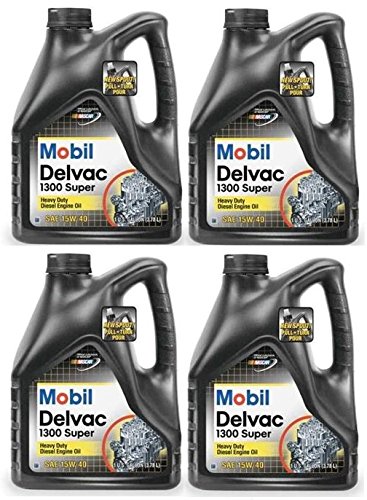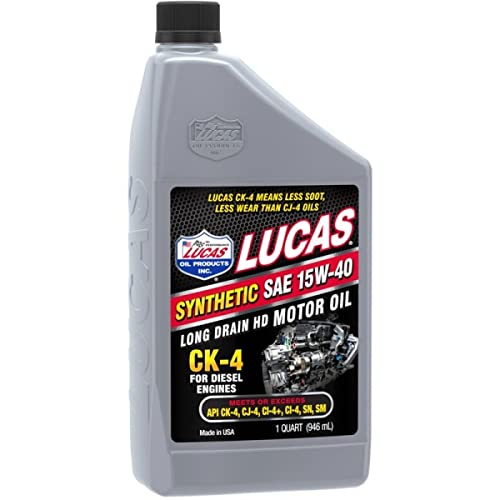Selecting the right 8W-40 synthetic oil is a critical decision for any vehicle owner looking to ensure optimal engine performance and longevity. The correct oil reduces friction, manages engine heat, and keeps internal components clean from harmful deposits. With numerous brands and formulations on the market, finding the best option for your specific engine requirements can be a complex task.
This review simplifies your search by analyzing the top-performing 8W-40 synthetic oils available. We have compiled a list of leading products, evaluating their key features, benefits, and the protection they offer. Our goal is to provide you with the necessary information to make a confident purchase that will keep your engine running smoothly for miles to come.
Our Top Picks for 8W-40 Synthetic Oil
- Valvoline Premium Blue SAE 15W-40 Diesel Engine Oil
- Lucas Oil Synthetic SAE 15W-40 CK-4 Diesel Oil – 1 Gallon
- Mobil 1 Delvac 1300 Super 15W-40 Diesel Engine Oil
- Lucas Oil Synthetic SAE 15W-40 CK-4 Diesel Oil (Pack of 4)
- Lucas Oil Synthetic SAE 15W-40 CK-4 Truck Oil (6 Quarts)
- Castrol Edge Euro 5W-40 A3/B4 Advanced Full Synthetic Motor Oil
- Mobil 1 Turbo Diesel Truck 5W-40 Full Synthetic Motor Oil
- Shell Rotella T6 Full Synthetic 5W-40 Diesel Motor Oil
Valvoline Premium Blue SAE 15W-40 Diesel Engine Oil

Valvoline Premium Blue stands out with a significant endorsement, being the only engine oil exclusively recommended by Cummins. This distinction speaks volumes about its quality and reliability for heavy-duty diesel applications. The formulation is engineered to meet the rigorous demands of modern diesel engines, providing a high level of performance and protection.
This oil offers strong shear stability, which ensures it maintains its protective viscosity grade even under extreme pressure and stress. This stay-in-grade performance is crucial for preventing wear on critical engine components. The result is outstanding wear protection that can help extend the operational life of your engine, making it a trusted choice for professional fleets and individual owners alike.
Lucas Oil Synthetic SAE 15W-40 CK-4 Diesel Oil – 1 Gallon

Lucas Oil Synthetic SAE 15W-40 CK-4 Diesel Oil is specifically designed to promote longer engine life. Its full synthetic formula provides a superior level of lubrication that reduces friction and wear on moving parts. This proactive protection is essential for maintaining engine health and performance over the long term, especially in demanding conditions.
One of the major benefits of this oil is the potential for extended oil change intervals. The robust formulation resists breakdown longer than conventional oils, which can lead to less frequent maintenance. This also translates to less filter maintenance, offering convenience and potential cost savings over time for diesel engine operators.
Mobil 1 112786 Delvac 1300 Super 15W-40 Diesel Engine Oil

Mobil 1 Delvac 1300 Super is a well-regarded name in the diesel engine oil market, known for its dependable performance. This 15W-40 oil is formulated for a wide range of diesel engines, providing reliable lubrication in various operating temperatures. Its versatility makes it a suitable option for many different applications.
The product is available in a convenient 4-gallon pack, which is ideal for those who need a larger supply for multiple oil changes or for fleet maintenance. It is designed to meet the specifications of diesel engines that require a 15W-40 grade, offering a balanced combination of cold-start capability and high-temperature protection.
Lucas Oil 11247 Synthetic SAE 15W-40 CK-4 Diesel Oil (Pack of 4)

This offering from Lucas Oil is a bulk pack of four 1-gallon containers of their Synthetic SAE 15W-40 CK-4 Diesel Oil. This packaging is perfect for commercial users or individuals with multiple vehicles, ensuring you have a consistent supply of high-quality oil on hand. The CK-4 specification signifies that it meets the latest performance standards for diesel engines.
The oil is engineered to contribute to longer engine life by providing exceptional protection against wear. A key feature of this formulation is its ability to maintain lower soot levels, which helps keep the engine cleaner and running more efficiently. This can lead to extended oil change intervals, reducing downtime and maintenance frequency.
Lucas Oil Synthetic SAE 15W-40 CK-4 Truck Oil/6×1/Quart

For those who prefer the convenience of quart bottles, Lucas Oil offers this six-pack of Synthetic SAE 15W-40 CK-4 Truck Oil. This size is often easier to handle and store, and it allows for precise measurement when topping off or performing a complete oil change. It is specifically designed for the heavy-duty needs of truck engines.
As a full synthetic oil meeting the CK-4 service category, it provides advanced protection for modern diesel truck engines. The formulation helps guard against deposits, wear, and thermal breakdown. Using quart bottles can simplify the process for DIY mechanics and ensure you use the exact amount of oil required for your engine.
Castrol Edge Euro 5W-40 A3/B4 Advanced Full Synthetic Motor Oil

Castrol Edge Euro 5W-40 is an advanced full synthetic motor oil formulated to meet the specific requirements of European engineered vehicles. Its 5W-40 viscosity grade offers excellent performance in both cold starts and high-temperature operation, making it a versatile choice for a range of driving conditions.
A standout feature of this oil is its superior viscosity control, which is measured to be 1.2 times better than the test limit. This helps the engine run more efficiently and for a longer period. It also provides twice the engine cleanliness compared to the test limit, working to maximize engine performance by preventing sludge and deposit formation.
Mobil 1 Turbo Diesel Truck 5W-40 Full Synthetic Motor Oil
Mobil 1 Turbo Diesel Truck 5W-40 Full Synthetic Motor Oil is engineered to meet the challenges of modern turbo diesel truck engines. The 5W-40 grade provides quick lubrication at startup, which is critical for protecting turbocharger components, while maintaining stability under the high temperatures generated by turbocharged engines.
This full synthetic formula is designed to provide exceptional protection against wear, deposits, and oil breakdown. It helps to maintain engine cleanliness and can contribute to overall engine efficiency. For owners of diesel trucks who face severe driving conditions, this oil offers a high level of performance and reliability.
Shell Rotella T6 Full Synthetic 5W-40 Diesel Motor Oil
Shell Rotella T6 Full Synthetic 5W-40 is a widely recognized and trusted product in the diesel community. It is formulated with advanced technology to provide superior protection for hard-working gasoline and diesel engines, including those with exhaust gas recirculation systems.
The oil offers excellent performance in extreme temperatures, providing reliable cold starts and protection under high heat. Its formulation helps to control wear, deposits, and oil breakdown, which can contribute to extended engine life. Many users report improved fuel economy and overall smooth engine operation when using this product.
How to Choose the Best 8W-40 Synthetic Oil
Choosing the right engine oil feels like a big decision, and it is. Your engine’s health and performance depend on it. When I’m looking for the best 8W-40 synthetic oil, I don’t just grab the first bottle I see. I think about a few key things that make a real difference for my vehicle.
First, I always check my vehicle’s owner’s manual. This is the most important step. The engineers who built your engine know exactly what it needs to run smoothly for years. The manual will tell you the specific viscosity grade and performance standards required. Using an oil that doesn’t meet the manufacturer’s specifications can void your warranty and potentially cause damage. So, before anything else, make sure 8W-40 is the right weight for your car, truck, or motorcycle.
Next, I look at the oil’s formulation and the additives it contains. Full synthetic oils are generally superior to conventional or synthetic blends. They offer better protection against extreme temperatures, reduce engine sludge, and can improve fuel efficiency. For high-performance engines, turbocharged engines, or vehicles I drive hard, a full synthetic is my only choice. I also pay attention to specific additive packages. Some oils are fortified with extra detergents to keep engines clean, while others have robust anti-wear additives like zinc (ZDDP) which is crucial for older engines or those with flat-tappet camshafts.
The third thing I consider is the API (American Petroleum Institute) certification. This little stamp on the bottle tells me the oil has passed a set of performance tests. For gasoline engines, you’ll look for the “SP” designation, which is the current highest standard. This is a quick way to know you’re getting a quality product that provides protection against oxidation, deposit formation, and wear.
Finally, I think about my specific driving conditions. Do I mostly take short trips where the engine never fully warms up? Do I tow heavy loads or drive in very hot or cold climates? For severe service like towing or racing, I look for an oil known for its high-temperature stability and shear strength. If I had a classic car that sits for long periods, I’d look for an oil with corrosion inhibitors. Matching the oil’s strengths to my engine’s demands gives me peace of mind that I’m giving my vehicle the best care possible.
FAQ
Is 8W-40 oil good for high-mileage engines?
Yes, it can be an excellent choice. Many 8W-40 synthetic oils are formulated specifically for high-mileage engines. They often include conditioners that help re-seal aging engine seals to prevent leaks, and additives designed to reduce burn-off in older engines. If your vehicle has over 75,000 miles and your manufacturer recommends this viscosity, a high-mileage 8W-40 can provide superior protection against wear and sludge buildup compared to a standard oil.
What is the difference between 5W-40 and 8W-40 oil?
The main difference is the oil’s viscosity, or thickness, at cold temperatures. The number before the “W” (which stands for Winter) indicates how the oil flows when the engine is cold. A 5W-40 oil is thinner at startup than an 8W-40 oil, which can be beneficial for extremely cold climates as it circulates slightly faster. However, both oils have the same viscosity at operating temperature (the “40”). An 8W-40 might be preferred in warmer climates or for engines that run at consistently high temperatures, as it can sometimes maintain a slightly more robust film under intense heat.
Can I use 8W-40 oil in my motorcycle?
Many motorcycles, especially larger V-twins and adventure bikes, are designed to use 8W-40 oil. It’s a very common viscosity recommendation for motorcycle engines. The key is to use an oil that is specifically formulated for motorcycles. Motorcycle oil often has different friction modifiers because it also lubricates the clutch (in a shared sump with the engine). Using a car oil not designed for a wet clutch can cause it to slip. Always check your motorcycle’s manual to confirm it calls for 8W-40 and to find the correct JASO or API specification.
How often should I change my 8W-40 synthetic oil?
While synthetic oil lasts longer than conventional oil, the change interval isn’t just about the oil’s life—it’s about the filter’s capacity and the contaminants the oil collects. A good rule of thumb is to follow your vehicle manufacturer’s recommended interval, which is often between 7,500 and 10,000 miles for synthetic oils. However, if you do a lot of stop-and-go driving, short trips, or towing, you should change it more frequently, perhaps every 5,000 miles. For the best 8W-40 synthetic oil to do its job, it needs to be fresh.
Why is synthetic oil more expensive, and is it worth it?
Synthetic oil is more expensive because it is chemically engineered from higher-quality base stocks and contains a more advanced package of additives. This process is more complex than refining conventional crude oil. I find it is absolutely worth the extra cost. It provides better engine protection across a wider temperature range, reduces wear, helps prevent sludge, and can even improve fuel economy. For me, the increased protection for my engine’s expensive internal components is a smart investment that pays off in the long run.